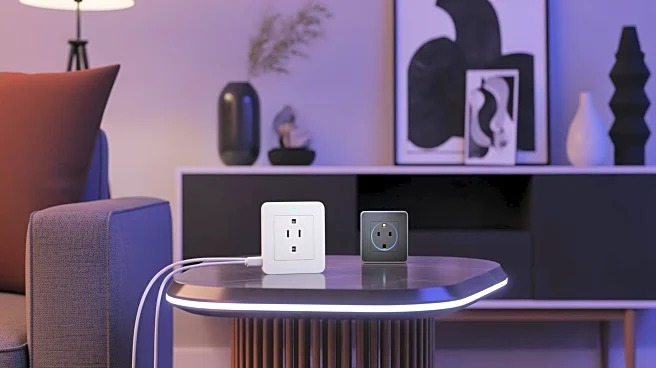What's Happening?
The article discusses the differences between smart plugs and smart outlets, highlighting their respective advantages and disadvantages for smart home setups. Smart plugs are noted for their ease of installation
and portability, making them ideal for renters who cannot perform electrical work. They are used to control various devices, including grow lights and ventilation systems, in container gardening setups. On the other hand, smart outlets offer a more permanent solution with better aesthetics, suitable for homeowners and locations requiring extra security. However, they require professional installation, which can increase costs. The article suggests that a combination of both smart plugs and outlets may be beneficial for most homeowners, while renters might prefer smart plugs due to their flexibility and lower cost.
Why It's Important?
The growing popularity of smart home technology reflects a shift towards more efficient and convenient living solutions, particularly in urban environments where space is limited. Smart plugs and outlets play a crucial role in this trend by enabling users to automate and control various home devices easily. This integration of technology into everyday life can lead to increased energy efficiency and cost savings, as users can monitor and manage their energy usage more effectively. Additionally, the ability to control devices remotely enhances security and convenience, appealing to both renters and homeowners. As smart home technology continues to evolve, it is likely to become an integral part of modern living, influencing how homes are designed and utilized.
What's Next?
As smart home technology advances, we can expect further innovations that enhance functionality and user experience. The development of more affordable and user-friendly smart outlets may encourage wider adoption among homeowners. Additionally, improvements in smart plug designs could make them even more compact and efficient, appealing to renters and those with limited space. The integration of smart home systems with other technologies, such as artificial intelligence and the Internet of Things, may lead to more sophisticated automation and control capabilities. Stakeholders, including tech companies and real estate developers, may explore new opportunities to incorporate smart technology into housing projects, potentially influencing market trends and consumer preferences.
Beyond the Headlines
The rise of smart home technology raises ethical and privacy concerns, particularly regarding data collection and security. As these devices become more prevalent, ensuring that user data is protected and used responsibly will be crucial. Additionally, the environmental impact of increased electronic device usage should be considered, prompting discussions on sustainable technology development. The cultural shift towards tech-driven living may also influence social dynamics, as individuals become more reliant on technology for daily tasks. These broader implications highlight the need for ongoing dialogue and regulation to address potential challenges associated with smart home technology.









